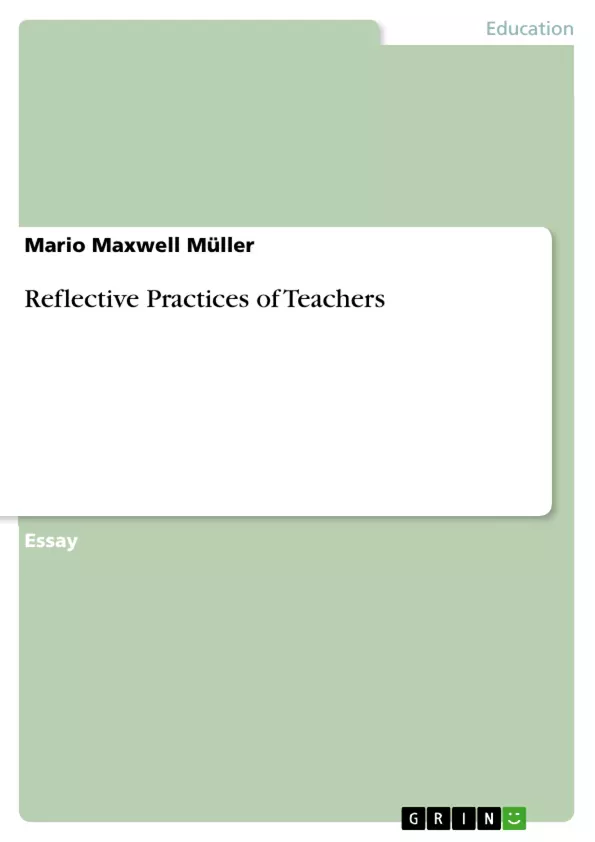The essay highlights the importance of teachers reflecting on their current teaching practices within an inquiry-based learning environment. The importance of separating the idea of curriculum and methodology, as part of the IB methodology students are expected to learn through the lens of inquiry-based activities, where students are encouraged to become effective communicators, risk-takers, being open-minded to new opportunities and learn through being knowledgeable of a particular topic.
As educators the most important process of planning involves reflecting on your own practices and looking for areas for concern and improvement, knowing that the students you teach and making remarkable progress and being innovative focussing on their 21st- century skills emphasising the importance of collaboration, cooperation and inquiry-based learning. These reflections are vital when you are teaching the PYP, MYP, GCSE, and DP programmes in international schools.
Inhaltsverzeichnis (Table of Contents)
- Abstract
- Introduction
- Reflective Practices for teachers to use within classrooms
- The value of reflecting on teaching practices
- The benefits of having a Professional Learning Community (PLC) at your school
Zielsetzung und Themenschwerpunkte (Objectives and Key Themes)
This essay focuses on the importance of teacher reflection on their teaching practices within an inquiry-based learning environment. It explores the role of reflection in improving classroom instruction, fostering student learning, and enhancing overall educational outcomes.
- The importance of teacher reflection in improving teaching practices
- The role of inquiry-based learning in fostering student development
- The value of professional learning communities (PLCs) in supporting teacher growth
- The integration of 21st-century skills in educational settings
- The benefits of collaborative learning and assessment practices
Zusammenfassung der Kapitel (Chapter Summaries)
- Abstract: This section briefly introduces the topic of teacher reflection within an inquiry-based learning environment, highlighting its importance in improving teaching practices.
- Introduction: This chapter delves into the significance of teacher reflection in evaluating teaching strategies and supporting student development as independent learners. It emphasizes the importance of inquiry-based learning and the role of student profiles within the IB methodology.
- Reflective Practices for teachers to use within classrooms: This section explores the process of reflection as a crucial element of effective teaching practices. It discusses the value of reflective practices in evaluating student understanding and identifying areas for improvement.
- The value of reflecting on teaching practices: This chapter elaborates on the benefits of teacher reflection in lesson planning, delivery, assessment, and evaluation. It emphasizes the role of reflection in promoting student engagement and understanding.
- The benefits of having a Professional Learning Community (PLC) at your school: This chapter examines the benefits of establishing professional learning communities (PLCs) in schools. It highlights how PLCs foster collaborative learning, support teacher growth, and promote student well-being.
Schlüsselwörter (Keywords)
The primary keywords and focus topics of this essay include assessments, inquiry-based learning, reflective practices, professional learning communities (PLCs), 21st-century skills, and the International Baccalaureate (IB) methodology. The essay explores the interconnectedness of these concepts in creating an effective and supportive learning environment for students.
Frequently Asked Questions
Why is teacher reflection important in inquiry-based learning?
Reflection is vital for teachers to evaluate their own practices, identify areas for improvement, and ensure that students are making progress as independent, innovative learners in environments like the IB programme.
What are the key 21st-century skills emphasized in this essay?
The essay highlights the importance of collaboration, cooperation, effective communication, and inquiry-based learning as essential skills for modern students.
What is a Professional Learning Community (PLC)?
A PLC is a collaborative group of educators at a school who work together to support teacher growth, share reflective practices, and ultimately improve student well-being and learning outcomes.
How does the IB methodology influence classroom activities?
Under IB methodology, students are encouraged to be risk-takers, open-minded, and knowledgeable by learning through the lens of inquiry-based activities rather than just following a fixed curriculum.
In which educational programmes are these reflective practices applicable?
These practices are vital across various international school programmes, including PYP, MYP, GCSE, and DP.
What is the role of student profiles in this context?
Student profiles within the IB methodology help guide development, encouraging students to become effective communicators and independent thinkers through reflective teaching.
- Quote paper
- Mario Maxwell Müller (Author), 2022, Reflective Practices of Teachers, Munich, GRIN Verlag, https://www.grin.com/document/1285157



